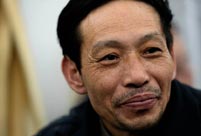BEIJING, Jan. 26 -- Japanese Prime Minister Shinzo Abe's diplomatic stunts in recent months, from the visit to Yasukuni Shrine to inflammatory comments at Davos, have proved nothing but the fact that he is an isolated troublemaker to the international order.
Last month, Abe made the first visit by a sitting Japanese prime minister in seven years to the Yasukuni Shrine, a temple where 14 Class A war criminals of World War II are enshrined.
Despite arguments Japanese officials have made for the provocative action, the visit honoring 14 notorious figures who ran the brutal war in China and Southeast Asia, in which millions were killed, is an insult to the millions whose deaths they caused.
By visiting the shrine, Abe has left no doubt about his dive into militarism and his belief that Japan's aggression in World War II was "just," the Pacific War Japan launched was "self-defense," and the trial at the Far East International Military Tribunal was "illegitimate."
Besides the visit, Abe has made one controversial action or offensive comment after another by worsening territorial disputes, calling for revision of Japan's post-war "peace constitution," and even comparing current China-Japan relations to those between Britain and Germany before World War I.
Of course, Abe's awkward displays were not successful and have only served to isolate Japan on the international stage.
While Abe hypocritically claimed to be seeking dialogue with China and the Republic of Korea (ROK), it is he who is closing the door to dialogue with leaders of other countries, as the words of this irresponsible politician cannot be believed.
Abe may have wanted to offer a conciliatory gesture to ROK President Park Geun-hye at the World Economic Forum in Davos, Switzerland, when he applauded her presentation from a front row seat, but the two leaders did not make any contact.
Abe's proposal of a "summit" with China was also ignored, as Chinese President Xi Jinping will not meet or talk with him during the upcoming Sochi Winter Olympic Games in Russia.
Although Abe has won some support from a few countries, the backing is unlikely to be sustained as it is increasingly obvious that Abe is deliberately ignoring historical justice and acting provocatively.
Even the United States, Japan's ally, was embarrassed by the provocation and has expressed "disappointment," one of the strongest diplomatic signals to Japan not to provoke regional tensions.
Military alliance will not bring security to Japan, if Abe chooses to maintain intense relations with Japan's neighbors.
Unless Abe immediately reflects on Japan's war history and respects human conscience, his government will continue to face an uncertain future amid the chill of international isolation.
 A 60-hour journey home
A 60-hour journey home Int'l Snow Sculpture Art Expo
Int'l Snow Sculpture Art Expo Highlights of China's air force
Highlights of China's air force Airline crew stage flashmob dance at Kunming airport
Airline crew stage flashmob dance at Kunming airport Top15 countries to retire to in 2014
Top15 countries to retire to in 2014 Hot supermodel's new photo album released
Hot supermodel's new photo album released Asia's heaviest box girder finishes 'rotation' in Wuhan
Asia's heaviest box girder finishes 'rotation' in Wuhan Completed facade of People's Daily new headquarters
Completed facade of People's Daily new headquarters Chinese-branded car passes North America standard safety test for the first time
Chinese-branded car passes North America standard safety test for the first time Li Na beats Bouchard to reach Australian final
Li Na beats Bouchard to reach Australian final  Explore the sources of PM 2.5
Explore the sources of PM 2.5 Highlights of Chinese airborne troops'exercises
Highlights of Chinese airborne troops'exercises  'Living in ice house' competition held in central China
'Living in ice house' competition held in central China  Chinese figure in Oscar nominations
Chinese figure in Oscar nominations  Top ten aerospace events in China 2013
Top ten aerospace events in China 2013Day|Week|Month